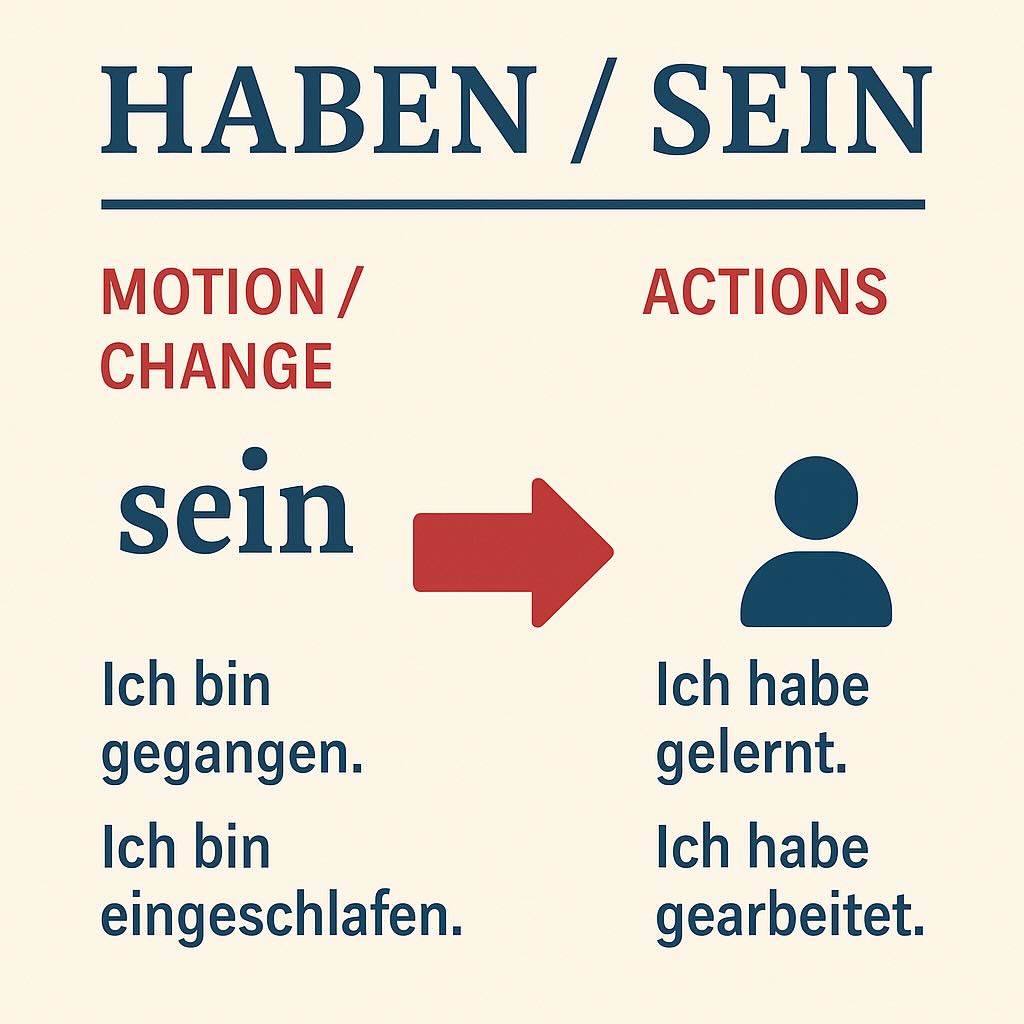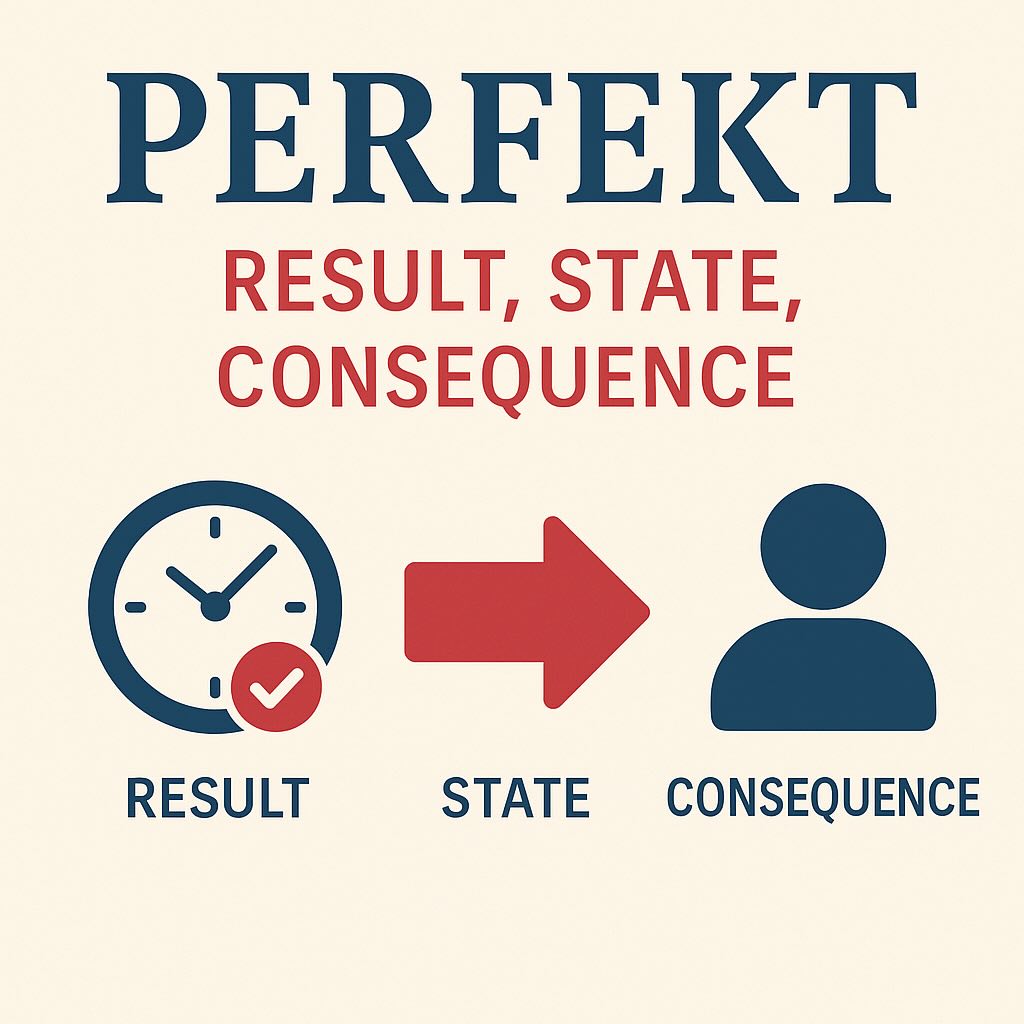“Perfekt is not just a tense. It is the German way of showing result, state, and consequence.” — Tymur Levitin
Introduction: More Than Just “Present Perfect”
Textbooks often say:
- Perfekt = spoken past.
But that is an oversimplification. Perfekt in German is not just the equivalent of English have done. It is the tense of result: it presents an action as completed and relevant now.
Perfekt is also the tense of regional identity: in the south of Germany, Austria, and Switzerland, it dominates everyday speech, while in the north it shares ground with Präteritum.
In this guide, we go far beyond the basics — down to the atoms of Perfekt.
1. How Perfekt Is Formed
Perfekt consists of:
- an auxiliary (haben or sein) in the present tense, and
- a past participle (Partizip II) at the end.
Regular pattern
- Ich habe gespielt.
- Ich bin gegangen.
Rules for Partizip II formation
- Most verbs → prefix ge- + stem + -t
- machen → gemacht, kaufen → gekauft.
- Strong verbs → ge- + stem change + -en
- sehen → gesehen, schreiben → geschrieben.
- Verbs with -ieren → no ge-
- studieren → studiert, telefonieren → telefoniert.
- Untrennbare Präfixe (be-, ver-, ent-, er-, zer-, ge-) → no ge-
- besuchen → besucht, verstehen → verstanden.
- Trennbare Präfixe → ge- comes after prefix
- aufmachen → aufgemacht, anrufen → angerufen.
Pronunciation in real life
- Standard: gesehen, gemacht.
- Colloquial (south/Swiss): gsehn, gmacht.
- This is not “lazy” speech but a regional standard.
2. The Auxiliary Question: haben vs sein
The key puzzle: when do we use haben and when sein?
Rule of thumb
- haben → actions, activities, transitive verbs.
- sein → movement, change of state, verbs of becoming.
Examples:
- Ich habe geschlafen. (activity)
- Ich habe gelernt. (action)
- Ich bin eingeschlafen. (change of state)
- Ich bin gekommen. (movement)
Special verbs: Positions and Reflexives
- sitzen, stehen, liegen → normally haben:
- Ich habe gesessen, ich habe gestanden, ich habe gelegen.
- ❗ In Austria/south: ich bin gesessen, ich bin gestanden, ich bin gelegen.
- setzen, stellen, legen (actions) → always haben:
- Ich habe mich gesetzt, ich habe etwas gestellt, ich habe das Buch gelegt.
👉 Rule: if the verb is reflexive (sich) → always haben.
Replacement forms
- Ich bin gewesen ↔ Ich war (spoken substitution).
- Ich habe gehabt ↔ Ich hatte (spoken substitution).
- Ich war gewesen = Plusquamperfekt (I had been). Cannot be reduced to ich war.
- Ich hatte gehabt = correct but heavy. Used for emphasis on prior possession.
3. Perfekt vs English Present Perfect
- English Present Perfect stresses connection to the present.
- German Perfekt often overlaps with English Simple Past in meaning.
Examples:
- Ich habe das gestern gemacht. = “I did it yesterday.”
- English would rarely use have done with explicit past time (yesterday).
👉 This is why learners confuse Perfekt with English Perfect.
4. Regional and Social Distribution
- South Germany, Austria, Switzerland → Perfekt dominates, even for sein and haben.
- North Germany → Präteritum still used in daily life.
- Switzerland → Perfekt for everything:
- Ich bin gewesen instead of ich war.
- Ich habe gehabt instead of ich hatte.
5. Edge Cases and Paradoxes
Sitzen / Setzen
- Ich habe gesessen (std).
- Ich bin gesessen (south).
- Ich habe mich gesetzt (always haben because reflexive).
Stehen / Stellen
- Ich habe gestanden (std).
- Ich bin gestanden (Austria).
- Ich habe gestellt (always haben).
Liegen / Legen
- Ich habe gelegen (std).
- Ich bin gelegen (dialect).
- Ich habe gelegt (action).
Hängen
- State: ich habe gehangen.
- Action: ich habe gehängt.
6. Perfekt in Exams vs Real Life
- Exam-safe rules:
- haben for actions, sein for motion/change.
- No dialectal ich bin gesessen.
- Real life:
- South: sein often used for static verbs.
- Shortened forms (gsehn, gmacht) accepted.
- Substitutions (ich bin gewesen, ich habe gehabt) common.
7. Tables for Survival
Auxiliary choice
| Verb | Perfekt (standard) | Regional/colloquial | Präteritum |
|---|---|---|---|
| sein | ich bin gewesen | ich war | ich war |
| haben | ich habe gehabt | ich hatte | ich hatte |
| sitzen | ich habe gesessen | ich bin gesessen (south) | ich saß |
| setzen | ich habe mich gesetzt | — | ich setzte mich |
| stehen | ich habe gestanden | ich bin gestanden (Austria) | ich stand |
| stellen | ich habe gestellt | — | ich stellte |
| liegen | ich habe gelegen | ich bin gelegen (dialect) | ich lag |
| legen | ich habe gelegt | — | ich legte |
| hängen (state) | ich habe gehangen | — | ich hing |
| hängen (action) | ich habe gehängt | — | ich hängte |
8. Philosophical Note: Partizip II
Perfekt always ends with a Partizip II. Why? Because German describes an action as a state that results.
- Ich bin gewesen = I was → I remained in a state of having been.
- Ich habe gemacht = I have something done.
👉 This deserves its own article: “Why German Needs the Past Participle: Action, State, and Result.”
Conclusion
Perfekt is not “just spoken past.”
It is the tense of result, state, and regional identity.
It tells us not just that something happened, but what state we are in now because of it.
TL;DR
- Perfekt = result, consequence.
- Formed with haben/sein + Partizip II.
- haben = actions, sein = motion/change.
- Exam-safe: ich habe gesessen, ich habe gestanden, ich habe gelegen.
- Real life: South/Austria/Swiss → ich bin gesessen/gestanden/gelegen.
- Spoken: clipped forms (gsehn, gmacht).
- Substitutions: ich bin gewesen ↔ ich war, ich habe gehabt ↔ ich hatte.
- ich war gewesen ≠ ich war, ich hatte gehabt = correct but heavy.

Recommended Articles
- Perfekt vs Präteritum: Fact vs Result, Logic vs Reality
- The Complete Guide to German Passive (Part 10)
About the Author
Tymur Levitin — Founder, Head Teacher & Translator
© Tymur Levitin — Levitin Language School / Start Language School by Tymur Levitin
Global Learning. Personal Approach.














